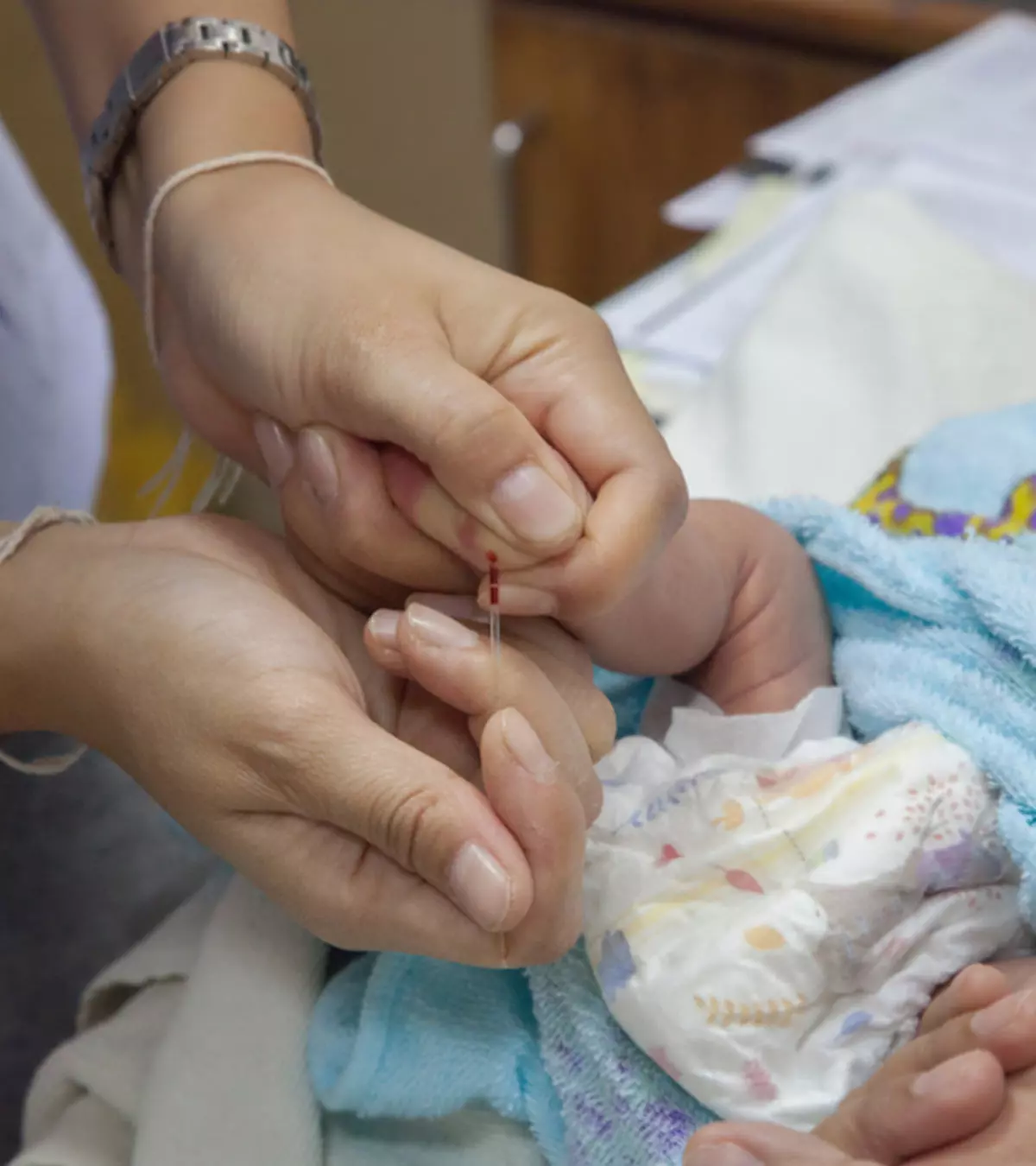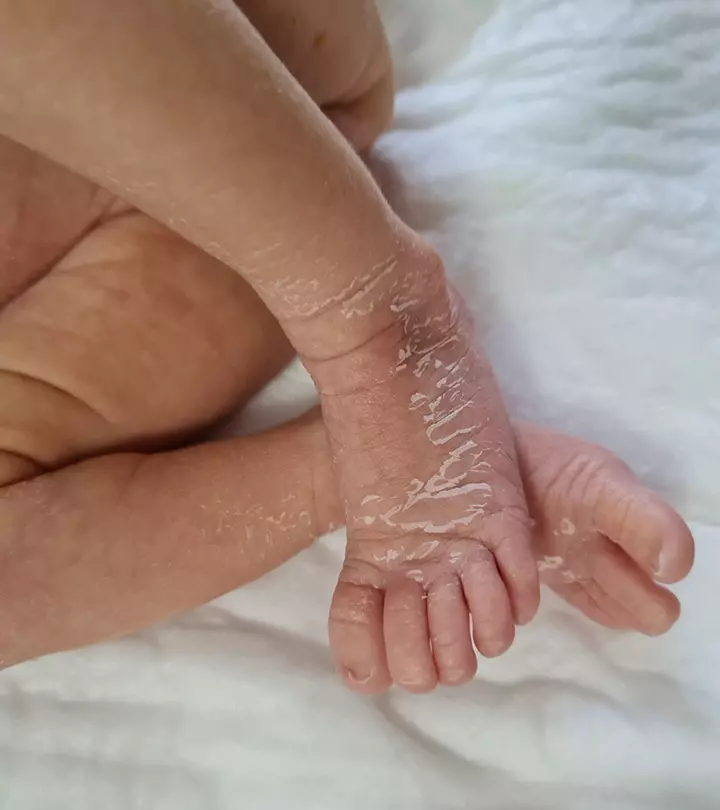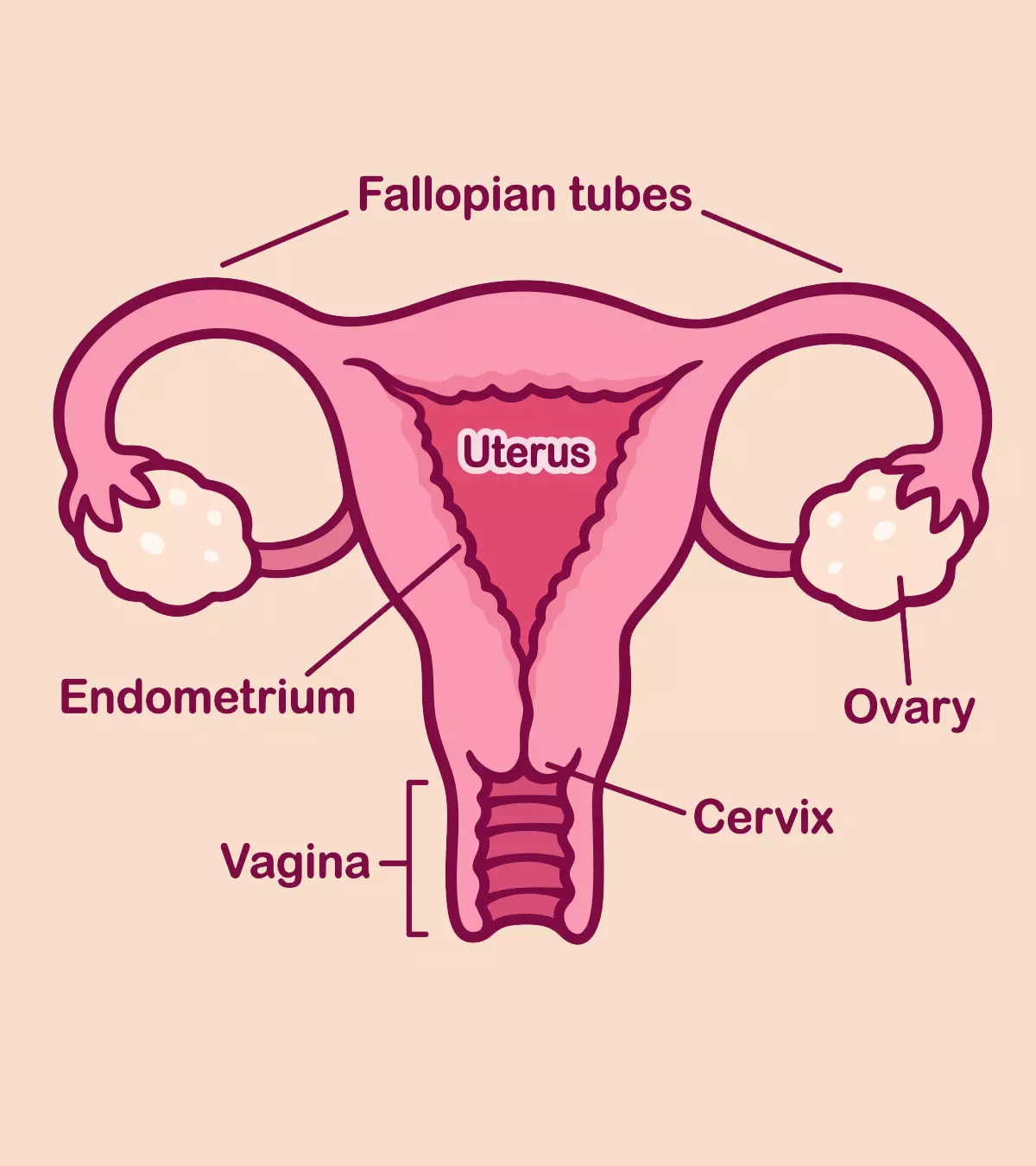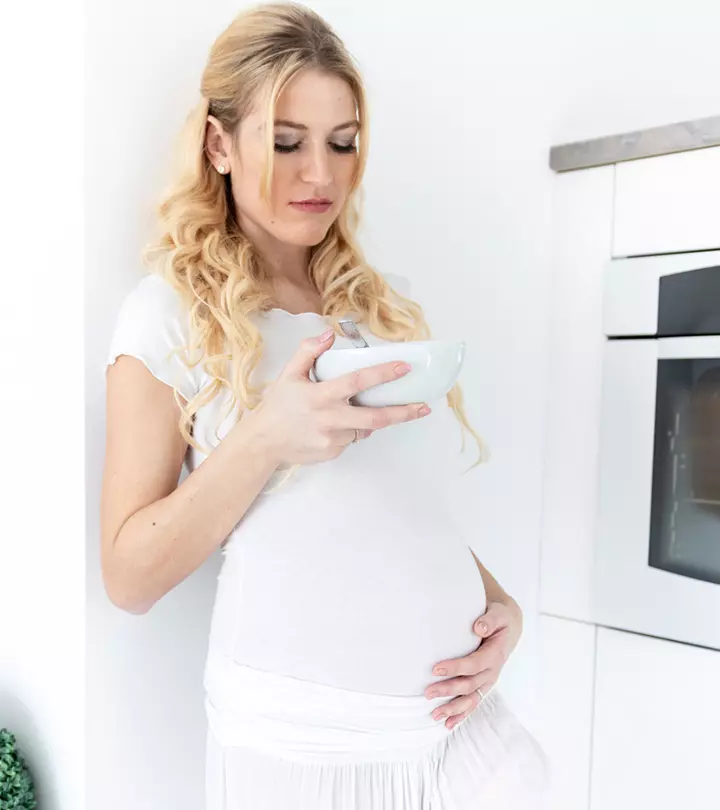
Image: Shutterstock
Women’s bodies undergo various physiological changes during pregnancy, and nosebleeds often result from them. You may have strong or light bleeding from one or both nostrils during a nosebleed, and the duration of the bleeding may range from a few seconds to more than ten minutes. Pregnancy nosebleeds are mostly brought on by changes in progesterone and estrogen hormone levels; however, increased blood flow through the nasal passages and relaxed tissues are also contributing factors. Read this article to understand more about the connection between pregnancy and nosebleeds and measures to prevent it (1) (2).
Key Pointers
- Nosebleed is a common pregnancy-related symptom that mainly occurs due to hormonal changes and increased blood flow in nasal passages.
- Pregnancy tumors and medical conditions, such as high blood pressure, can cause severe nose bleeding during pregnancy.
- In most cases of nosebleeds during pregnancy, no medical treatment is required.
- It is advised to call a doctor if the nosebleed does not stop after 20-30 minutes or if the blood flow is too heavy.
Are Nosebleeds Common During Pregnancy?
Also known as epistaxis, nosebleeds are a common pregnancy-related symptom with a prevalence rate of about 20% in pregnant women compared to a prevalence rate of about 6% in non-pregnant ones. In most cases, having nosebleeds while pregnant may not be a cause for concern and does not require medical attention (3).
 Did you know?
Did you know?When Do Nosebleeds Start In Pregnancy?
You may experience nosebleeds at any point during pregnancy, right from the first trimester to the time of delivery. Also, the amount and frequency of nosebleeds during pregnancy vary depending on the pregnant woman, her medical history, lifestyle, and other factors.
In fact, you may even have nosebleeds while you’re sleeping. If you are lying on the bed, you may feel liquid in the back of your throat before blood comes out of your nose. While you should not worry about light nose bleeding, make sure to contact your healthcare provider if you experience frequent or severe nosebleeds during pregnancy (1) (4).
An anonymous blogger recounts her nosebleed episode during the 30th week of pregnancy. She says, “Last week, I had a 30-minute nosebleed which was pouring out and just wouldn’t stop. Since then, if I even sniff, I feel like it’s about to start again. During my last pregnancy, I suffered from nosebleeds badly… I tried tipping my head back, but it went down my throat and made me want to throw up (i).”

Image: Shutterstock
What Can Cause Nose Bleeding During Pregnancy?
During pregnancy, nosebleeds can be caused by several factors, including (4):
- Increased blood flow to the nasal passages: The increased blood volume in your body during pregnancy can cause your nasal blood vessels to become more fragile and prone to bleeding.
- Hormonal changes: Changes in pregnancy hormones result in various changes in your body, including changes in the nasal passages. They can cause the nasal passages to dry, leading to nosebleeds and congestion.
- Dehydration: Pregnancy increases fluid demands to support the growth of the baby. However, if you don’t drink enough water and become dehydrated, it can cause the mucus membranes in your nose to dry out and crack, increasing the risk of nosebleeds.
- Sinus infections or allergies: These conditions can cause inflammation in the nasal passages and can easily irritate the nasal linings, leading to nosebleeds.
- Pregnancy rhinitis: It is a common pregnancy condition, especially during the first trimester, that causes a blocked (congested) and stuffy nose due to inflamed nasal mucous membranes. Pregnancy rhinitis could also contribute to the risk of nosebleeds during pregnancy (5).
- Dry air: Dry air, dry indoor heating, too much air conditioning, cold weather, and low humidity can also dry out the nasal passages, making them more susceptible to bleeding (6).
- Medical conditions: Certain medical conditions, such as hypertension, pregnancy-related clotting disorders (7), and toxemiaiAlso known as blood poisoning or septicemia, where there is a buildup of toxins in the blood caused by the spread of bacterial infection , can cause a severe nosebleed during pregnancy (5) (6).
- Pregnancy tumors: Pregnant women can also have light to severe nosebleeds due to the development of pregnancy tumors, such as pyogenic granulomaiBenign skin lesions that appear as red, small, and raised bumps in response to hormonal changes or skin injury and hemangiomaiA benign or noncancerous growth that occurs due to the abnormal buildup of blood vessels , which are mostly benign and dissolves after childbirth (5) (6).
 Quick fact
Quick factSome other causes of nosebleeds during pregnancy are (8):
- Nose injury
- Chemical irritants from certain nasal sprays
- Overuse of nasal sprays
- History of sinus or pituitary surgery

Image: Shutterstock
How To Stop A Nosebleed During Pregnancy?
There are some effective methods you may try to stop nosebleeds during pregnancy (4) (9).
- Lightly pinch your nostrils shut for about 10 minutes; if the bleeding is not stopped, try again.
- Do not lean or lie backward, as this posture increases the pressure on the nasal blood vessels; sit straight with your head in an upright position.
- You may also lean forward to prevent blood from flowing down the back of your throat in case of a severe nosebleed.
- Apply cold compresses on the nose, forehead, or back of your neck.
- Suck an ice cube.
It may not be possible to prevent all nosebleeds during pregnancy; however, you may try the following methods to avoid nosebleeds, especially if you experience frequent nosebleeds (4).
- Drink plenty of water to stay hydrated
- Use a humidifier at home
- Keep your nose moisturized
- Avoid doing strenuous exercises
- Try minimizing the force to blow your nose
- Get treated for sinus infections and allergies

Image: Shutterstock
Can Nosebleeds Affect Your Pregnancy?
While nosebleeds during pregnancy can be a nuisance for daily life, mostly, they can be easily managed at home without medication or treatment.
However, severe and more frequent nose bleeding may sometimes adversely affect the pregnancy due to acute blood loss. It may also put the baby at risk of developing fetal anemiaiWhen the hemoglobin levels and red blood cells count drop below normal in a fetus and can also lead to emergency delivery during the third trimester.
There are a few studies where pregnancy termination was shown as the best resolution since maternal changes in blood volume and nasal mucosa cease as soon as the baby is delivered (10). However, severe outcomes and unfavorable prognosis of nose bleeding during pregnancy are very rare unless caused by serious underlying illnesses.
 Be watchful
Be watchfulWhen To Worry About Nosebleeds In Pregnancy?
Nose bleeding due to the following serious conditions usually requires prompt treatment to avoid potential maternal and fetal complications.
- Pregnancy tumors
- Hypertension
- Clotting disorders
- ToxemiaiAlso known as blood poisoning or septicemia, where there is a buildup of toxins in the blood caused by the spread of bacterial infection
Treatment may involve hospitalization, especially if the woman is in the third trimester. Besides treatment for the underlying cause, the following treatments may be considered specifically for nose bleeding (3) (10).
- Nose packing
- Hemostatic foam/sponge
- Bipolar cautery or diathermyiA simple and short procedure that involves an electronic device to deliver heat to the nasal mucous membranes to stop bleeding
- Tranexamic acid intravenous therapyiA therapy where the tranexamic acid is infused or injected intravenously to stop or control bleeding
- Surgical vessel ligation

Image: Shutterstock
When To Call A Doctor?
Call a doctor or seek immediate medical care if (4) (9) (11):
- The nosebleed does not stop after 20-30 minutes
- The blood flow is too heavy
- You have high blood pressure
- You are experiencing nosebleeds too frequently
- You have vomited or ingested a lot of blood
- You have other symptoms, such as fever and breathing difficulty, along with a nosebleed
- Nose bleeding is due to a head injury or trauma
- You’re taking anticoagulants
Frequently Asked Questions
1. Can preeclampsia cause nosebleeds?
Yes. Since preeclampsia in pregnancy is characterized by high blood pressure, which is a potential cause of nosebleeds, it can contribute to the risk of nosebleeds during pregnancy (12).
2. Are nosebleeds a sign of anemia during pregnancy?
Although there is no direct association between a nosebleed and anemia; however, if a pregnant woman has excess nosebleeds too frequently for a prolonged time, it may cause anemia (4).
3. Is nose bleeding a symptom of gestational diabetes?
No. Nose bleeding is not a symptom of gestational diabetes. However, taking metformin in pregnancy to manage gestational diabetes may potentially cause a nosebleed as its rare side effect (13) (14).
4. Does a nosebleed in pregnancy say something about gender?
There is no scientific evidence to suggest that nosebleeds during pregnancy are related to the gender of the fetus.
5. Is nose bleeding a sign of pregnancy?
Nosebleeds are not a specific pregnancy symptom; however, if you are experiencing a nosebleed, along with other pregnancy symptoms, such as dizziness, vomiting, and missed periods, you may consider taking a pregnancy test.
A nosebleed during pregnancy is mainly caused by an increased blood volume and hormonal fluctuations. But you may also have a nosebleed due to cold, infections, pregnancy rhinitis, cold weather, pregnancy tumor, or other medical conditions, including a bleeding disorder. Generally, a minor nosebleed may not be harmful to you or your baby, but in the case of heavy and recurrent nosebleeds, it may affect you or your baby. While most nosebleeds during pregnancy can be easily managed at home, seek medical care if you have severe nose bleeding.
Infographic: How To Prevent Recurrent Nosebleeds During Pregnancy?
Nosebleeds become common during pregnancy due to hormonal changes and increased blood flow in the nasal passages. The majority of the time, though, it is easily preventable at home. Let’s look at the infographic below for a few simple tips that can help to prevent experiencing frequent nosebleeds during pregnancy.
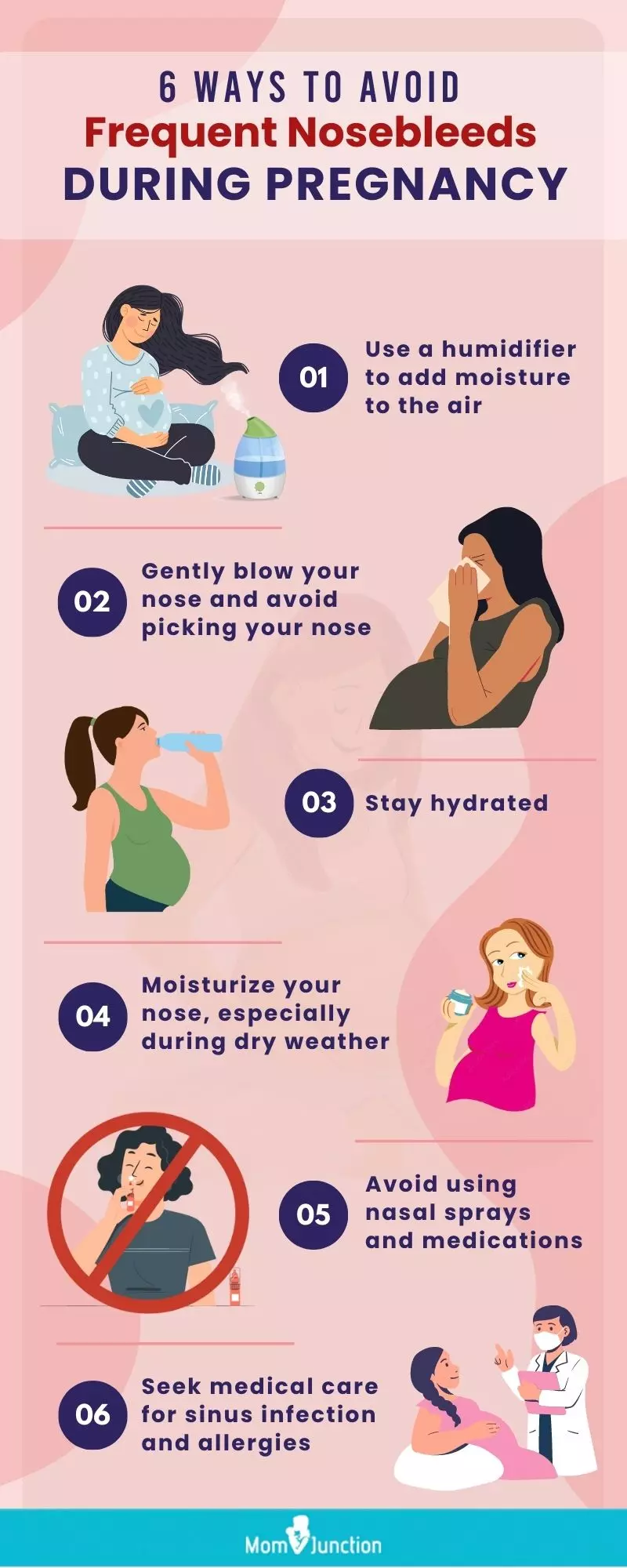
Illustration: Momjunction Design Team
Illustration: Nosebleeds During Pregnancy: Causes And Ways To Stop Them

Image: Dall·E/MomJunction Design Team
Personal Experience: Source
MomJunction articles include first-hand experiences to provide you with better insights through real-life narratives. Here are the sources of personal accounts referenced in this article.
i. Glum Mums; Pregnancy woes.https://babyurbeautiful.blogspot.com/2013/11/glum-mums-i-pregnancy-woes.html?m=1
References
- Nosebleeds in pregnancy
https://www.nhs.uk/pregnancy/related-conditions/common-symptoms/nosebleeds/ - Nosebleeds during pregnancy.
https://www.nct.org.uk/information/pregnancy/body-pregnancy/nosebleeds-during-pregnancy - Maria Grazia Piccioni et al (2019) Management of Severe Epistaxis during Pregnancy A Case Report and Review of the Literature
https://www.ncbi.nlm.nih.gov/pmc/articles/PMC6360570/ - Nosebleeds While Pregnant
https://my.clevelandclinic.org/health/symptoms/22342-nosebleeds-while-pregnant - V. Shiny Sherlie and Ashish Varghese (2014) ENT Changes of Pregnancy and Its Management
https://www.ncbi.nlm.nih.gov/pmc/articles/PMC3918343/ - What causes nosebleeds in pregnancy and tips to manage them
https://utswmed.org/medblog/nosebleeds-during-pregnancy/ - Rosa Elizabeth Mary Crunkhorn et al (2014) Torrential epistaxis in the third trimester a management conundrum
https://www.ncbi.nlm.nih.gov/pmc/articles/PMC4195212/ - Nosebleed
https://medlineplus.gov/ency/article/003106.htm - Nosebleeds during pregnancy
https://www.pregnancybirthbaby.org.au/nosebleeds-during-pregnancy - Laura Giambanco et al (2019) The way a nose could affect pregnancy severe and recurrent epistaxis
https://www.ncbi.nlm.nih.gov/pmc/articles/PMC6859019/ - Nosebleeds During Pregnancy
https://americanpregnancy.org/healthy-pregnancy/pregnancy-concerns/nosebleeds-during-pregnancy/ - Preeclampsia
https://my.clevelandclinic.org/health/diseases/17952-preeclampsia - Taking metformin for gestational diabetes
https://www.medsafe.govt.nz/consumers/educational-material/MetforminforGestationalDiabetes.pdf - Viroj Wiwanitkit (2011) Metformin high dosage and bleeding episode: A clinical case study
https://www.ncbi.nlm.nih.gov/pmc/articles/PMC3125003/
Community Experiences
Join the conversation and become a part of our nurturing community! Share your stories, experiences, and insights to connect with fellow parents.
Read full bio of Dr. Ben Abbes Taarji Hicham
Read full bio of Reshmi Das
Read full bio of Rebecca Malachi
Read full bio of Aneesha Amonz












